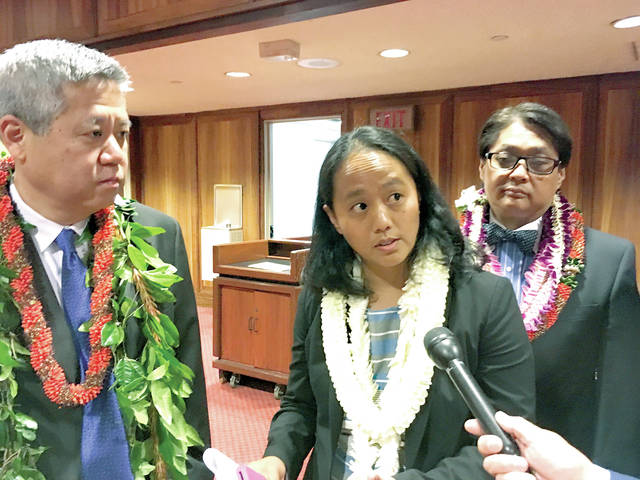HONOLULU — Women lawmakers at the Hawaii state Capitol want the House and Senate to update rules on handling sexual harassment complaints — a push that comes amid high-profile misconduct allegations nationwide and after a former Hawaii House speaker resigned after acknowledging inappropriate behavior toward women.
Under current rules, leaders of each chamber or the leader’s designee must evaluate complaints or assign people to investigate them. If a speaker or Senate president is accused of harassment, there’s a possibility he or she could have a conflict of interest in assessing the complaint.
“We have to look at that issue of who people have to report to, and whether or not they feel comfortable reporting to that person, and whether or not there is a need for some kind of independent reporting procedure,” said Democratic Rep. Della Au Belatti, the House majority leader and one of the leaders of the Hawaii Women’s Legislative Caucus.
Former Hawaii House speaker Joe Souki, 86, resigned from the Legislature last month after the Hawaii State Ethics Commission said he acknowledged inappropriate and unwelcome touching and kissing of women. The Maui Democrat apologized for his conduct and paid a $5,000 fine.
Rachael Wong, the only woman to speak publicly about her complaint against Souki, said he behaved inappropriately in 2015 when she was director of the state Department of Human Services and he was speaker.
House policy currently calls for employees witnessing problematic conduct to report it to their immediate supervisor, the next highest level supervisor or the House speaker. It says either the speaker or the speaker’s designee — usually the House clerk — will investigate the complaint.
The Senate has similar reporting guidelines, though they also cover non-employees who have business at the Legislature such as vendors and lobbyists. The chamber’s rules call for the Senate president to be notified and resolve the matter if possible.
The rules also say the president can appoint a committee to investigate and make recommendations to the president.
Wong said it’s encouraging that lawmakers are interested in reforms. But she hopes the onus for making changes doesn’t just fall on women because sexual harassment affects everyone.
Wong filed her complaint against Souki with the ethics commission. She didn’t have the option of filing with the House because its policies don’t cover non-employees.
But even if she had that option, Wong said she wouldn’t have felt safe doing it because of the decision-making power lawmakers have over funding and government policy.
“There are direct repercussions (for) not only going against what is expected, but speaking out in ways that disrupt that status quo,” she said. A culture of silence also discourages people from speaking up, she said.
It is not known whether Souki is one of three House members who were subjects of sexual harassment or sexual misconduct complaints to the Legislature in the past decade. The House provided the figure to The Associated Press in December in response to a request under the state’s open records law.
The House said state law required it to withhold the identities of the lawmakers because none was suspended or expelled. The Senate reported one member was the subject of a complaint over the same time period. The Senate similarly refused to disclose the senator’s identity.
Democratic Sen. Laura Thielen, another leader of the women’s caucus, said fairness calls for the House and Senate to have a common standard. She favors giving people multiple avenues to file complaints in case they are uncomfortable with a particular option.
“It’s in the Legislature’s best interest to learn some lessons from what happened and to be willing to change our policies and procedures so that people can have confidence in them,” said Thielen, who represents Kailua and Waimanalo.









